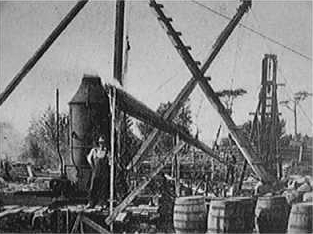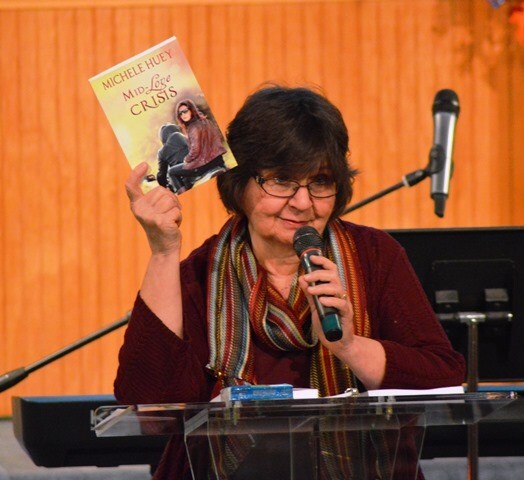Michele Huey's Blog: God, Me, and a Cup of Tea, page 14
June 18, 2022
My Father’s Lap

In the shadow of thy wings I will take refuge, till the storms of destruction pass by. – Psalm 57:1 (RSV)
When I was growing up, there was only one place where I could escape my mother’s wrath—my father’s lap. I was an impulsive child, and my mother wasn’t blessed with patience, so when our wills clashed, sparks flew.
Mom was the firestorm; Dad the quiet stream. I loved them both, but it was to Dad I turned when I needed a listening ear or when I just needed cuddled. Curled up in his lap, resting my head on his shoulder, feeling his arms around me, was the safest place in the world.
Fast forward forty years. I am now a mother, still a bit impulsive, fiery when I get going. My husband is like my father—a soothing balm to my blistering heat. One of my children has impulsively done something that could cast a dark shadow over the future. I am so furious, I shake. I feel heat radiating from my face.
“How could you do this?” I shout. “When we get home, you will tell your father what you’ve done.”
But the scene doesn’t turn out as I expect. There, curled up in my husband’s lap, is our errant, remorseful child.
Fast forward eight more years. I am now a grandmother. As my family has multiplied, so have my love and concern. I pray for my children and grandchildren every day, but still I worry. I am at the age where I realize how fragile life really is and how dangerous a place the world is. I have much more to lose now.
As I sit in the family room, my head rests on the wing of the love seat where I’m curled up. Eyes closed, I imagine myself sitting in my heavenly Father’s lap, resting my head on His shoulder, feeling His arms around me.
I speak no words, but peace, like a placid stream, gently seeps into my soul. I am in the safest place in the world.
Abba, Father, thank You for Your unconditional love. Amen.
Read and reflect on Psalm 57
From God, Me & a Cup of Tea for the Seasons: 101 devotional readings to savor during your time with God, Copyright © 2018 by Michele Huey
June 11, 2022
Journey Back Home

If we are faithless, He remains faithful; He cannot deny Himself. – 2 Timothy 2:13 (NKJV)
I got up this morning at 5:30—a good hour and a half before my scheduled “rise and shine” time. At first I thought I’d go back to bed after my bathroom trek, but my already too-long do-list got longer yesterday when I added an ambitious project with a Nov. 30 deadline. So I knew snuggling back under the covers would be futile. I’d just toss and turn and think and think and think. Body tired, mind wired. You know the feeling.
So I made my cup of caffeine, dressed, and headed to my study.
Since I was up early, I decided to have my quiet time, which, I’m ashamed to admit, has been sorely lacking. I opened my prayer notebook first. My last entry was Feb. 10. And the time before that was Jan. 17. Well, at least it was this year. When I opened my spiritual journal, I was aghast when I saw the date of the last entry: Dec. 14. My Bible study notebook was just as pathetically neglected. I used to write in them every day.
No wonder I’d been feeling adrift, mentally and spiritually.
Last year I blamed my dwindling time with God on life issues, particularly health challenges and family relationships, the latter undergoing tumultuous changes.
Have you ever felt like you’re standing in the midst of fallout you didn’t create? Yet there you are, stuck in the middle of it all, hanging on to a diminishing sense of direction. Well, that’s where I was last year.
This year, as those issues began to smooth out, a monster project took over my life: planning a month-long trip with our fifth-wheel camper to the Pacific Northwest with two other couples. Not an undertaking to sneeze at. Coordinating schedules, planning routes and stops and meals and clothes, getting the camper and truck ready for a 7,000-mile trip, downloading and learning to use travel apps we’d use on the journey—chunk by chunk usurped my time. Small wonder I’m way behind on my novel-writing schedule.
But I shouldn’t blame busyness for not taking time with God. I mean, who really sets my schedule? I’m my own worst taskmaster—slave driver is a better term.
But the more I got done, the less fulfilled and more empty I felt.
You can’t replace God with busyness, no matter how urgent or necessary your activities are. Only God can satisfy your soul. And if your spirit is empty of Him, your entire being—physical, mental, and emotional—is affected. It’s like you’re on a journey with no destination, without a map or app or plan, and are running on fumes.
So this morning, when I finally took quality time to meet with God (and not with one eye on the clock), God met with me. He had, after all, been patiently waiting for me to stop manufacturing excuses and make time with Him my top priority once again.
I opened my Bible to where I’d left off with my personal (and also sporadic) Bible study two months ago, Psalm 37: “Consider the staggering fact that the Creator of time and eternity loves you,” I read in the warm up section. “Write down 10 things you can think of about the love of God.”
Wow! What a place to begin my journey back to God—His love for me. The first three came easily—I’d been pondering them all year: Unconditional. Undeserved. Unlimited. Then, like water sputtering from a hand pump, more words to describe God’s incredible love for me poured forth: steadfast, eternal, healing, unchanging, sacrificial, reliable.
God’s love—the more I meditated on it, the harder it was to wrap my mind around it.
I hadn’t been faithful to Him, but He’d remained faithful to me.
As I wrote the words of Lamentations 3:21–23 in my spiritual journal and the words of Psalm 51:10–12 in my prayer notebook, I knew I’d finally returned home.
Thank you, Father, for Your steadfast, unlimited love. I don’t deserve it, but that’s what unconditional means, doesn’t it? Thank You for pouring its healing grace into my thirsty, travel-weary soul. Amen.
Read and meditate on Lamentations 3:21–23
(c) 2017 Michele Huey. All rights reserved.
.
June 4, 2022
To the Hilt (Graduation Thoughts)
“I have come that they may have life, and have it to the full.” —Jesus, as quoted in John 10:10 (NIV)
“Wherever you are, be all there. Live to the hilt every situation you believe to be the will of God.” —Jim Elliott
When I read this quote by the late missionary Jim Elliott, it made me think: What does it mean to “live to the hilt”?
The hilt, the handle of a sword, is the only part visible when the blade is plunged in all the way. “To the hilt,” then, means giving something your all—one hundred percent, no reserve.
To me, living to the hilt means three things.
First, living to the hilt means exploring every God-given dream and pursuing the vision.
When I was in high school, I dreamed of becoming a writer. My life’s path led to teaching, which still remains a passion of mine, but the dream of writing never died. Twenty-three years after I graduated from college, I published my first pieces—a couple of devotionals in The Upper Room and a personal experience story in Guideposts. I’ve now published three novels and four books of devotional readings, and have another novel in the works.
The road hasn’t been easy. The learning curve can be steep, and it’s ongoing. When you reach one level, you find there’s another to master.
But when God gives you a dream, you must work to make it a reality. What you are is God’s gift to you. What you make of yourself is your gift to God. Remember the parable of the talents? Only the two who used what they were given received the commendation of “Well done, good and faithful servant!”
So discover, develop, and dispense your God-given gifts. Pursue the vision.
Second, living life to the hilt means doing—giving—your best, every moment, every breath. “Whatever your hand finds to do, do it with all your might” (Ecclesiastes 9:10). “Whatever you do, work at it with all your heart” (Colossians 3:23).
All your might. All your heart. Nothing held back.
And don’t let fear hold you back. Fear doesn’t come from God. What Paul wrote to the young pastor Timothy is still true today: “God has not given you a spirit of fear or timidity, but of power, love, and self-discipline” (2 Timothy 1:7). He has filled you with His Holy Spirit. Remember, God is for you—He’s your biggest cheerleader. And if God is for you, then who or what can succeed against you? (Romans 8:31)
So, go on, give it your best shot. Give it your all.
Third, living to the hilt means looking forward, not back.
Too often, we play the “if only” game, weaving a web of regret—and getting tangled in it. Don’t waste time and expend energy on what could have been. Use the past to build the future. Learn from your mistakes and move on.
So what if things didn’t turn out the way you planned—the way you wanted? God, ultimately, is in control. He knows what He’s doing. Forget what’s behind and reach forward to what’s ahead. Press on toward your God-given goal (Philippians 3:13–14).
Jesus came to give us life in all its fullness. That means living full, living abundantly, living to the hilt.
Remember the words of Abraham Lincoln: “In the end, it’s not the years in your life that count. It’s the life in your years.”
Thank You, God, for giving me a dream and showing me the way to make it come true. Amen.
Read and reflect on Matthew 25:14–30
From God, Me & a Cup of Tea: 101 devotional readings to savor during your time with God, © 2017 Michele Huey. All rights reserved.
May 28, 2022
Don’t Forget to Remember
 Photo courtesy of Beverly & Pack, flickr.com
Photo courtesy of Beverly & Pack, flickr.com“In the future when your descendants ask their fathers, ‘What do these stones, mean?’ tell them . . .” – Joshua 4:21–22 NIV
When three of our grandchildren were on different ball teams (plus one of them umpired), hubby and I were at the Punxsutawney Little League Fields just about every evening. After the sixth game in four days, I told Dean we should park our camper at the ball field.
Back then, the Punxsutawney Little League complex was almost a second home to us, as we spent many a summer afternoon and evening there when our youngest played baseball. Five well-maintained and lighted ball fields for Minor League, Little League, Senior Little League, what we call the “Teener League” field (VFW), and girls’ softball, are located beside Mahoning Creek.
Each ball field is named for someone local. Some honor those who have devoted much of their time to maintain and improve the fields and the league. Two fields are named as memorials.
The Little League field is called the “Billy Titus Memorial Field,” named after a Punxsutawney Little Leaguer who was killed in a farming accident.
The VFW League field, the Rich Kuntz Memorial Field, is named for SP4 Richard Lorraine Kuntz, who was killed in action in Vietnam on February 5, 1968, six weeks before his twenty-first birthday.
My grandson once asked me, “Who was Rich Kuntz? Why is the field named after him?” Since I’ve spent half a lifetime at the fields and know the stories behind the names, I was able to tell him. But it got me wondering: How many people drive right by those signs or even say the name of the ball field and don’t realize the significance?
Memorials are built and named so we won’t forget, so those who come after will learn of the sacrifice of the Vietnam soldier, the love a little leaguer who never got to play Senior League had for the game.
This weekend we observe Memorial Day, a day set aside to honor and remember our military men and women who gave their lives in service to our country.
Some died in action, some went missing in action and never were found, some died a slow death after they came home and tried to resume a normal life. Some are still alive, but they will never be the same.
Sadly, these holidays that are set aside to remember and honor those who have stepped to the plate for our country are too often perceived as simply a day off work, to relax, catch up on things, feast and frolic.
While there’s nothing wrong with any of those activities, let us not forget to remember why we observe Memorial Day.
On the way to the ball field, there’s a grassy field beside the road that’s covered with U.S. flags. Each time I passed it, more flags waved in the breeze. Then one day I slowed down to read the sign. Passersby are invited to place a free flag there in honor of a veteran.
I didn’t have time to stop then, but I made a special trip to that field and placed flags in honor of my loved ones who have served.
What about you? What are you doing to remember this Memorial Day?
Thank you, Lord, for those who gave themselves to serve, protect, and defend our country. Let us never forget the sacrifices they made. Amen.
Read and meditate on Joshua 4.
From God, Me, & a Cup of Tea for the Seasons © 2018 Michele Huey. All rights reserved. Used with permission.
May 21, 2022
Guide Rails, Lines, and Notches
 Image by Monsterkoi from Pixabay
Image by Monsterkoi from PixabayAll Scripture is inspired by God and is useful to teach us what is right and true and to make us realize what is wrong in our lives. It straightens us out and teaches us what is right. —2 Timothy 3:16 NLT
It was still dark when I left for work one snowy December morning a number of years ago. A winter storm made driving difficult. Even in our four-wheel-drive, I couldn’t go more than thirty miles an hour. Swirling white flakes pummeling my headlights made it hard to see the snow-covered road. On this secondary road, there were no guide rails to show me where the pavement ended and the berm began. Only occasional arrow signs indicated where there were sharp bends. Although I knew the road well, the darkness and blizzard-like conditions transformed the familiar into the unfamiliar.
Conditions weren’t much better when, ten miles and half an hour later, I reached the main highway. Snow covered both lanes. As I inched my way through the whiteout, a sound like I was driving on chains informed me that I had strayed into the opposite lane.
Guide rails and painted lines are meant to help the driver stay on his side of the road. But not all sections of highway have guide rails, and snow can obliterate the lines. That’s why notches were cut into the middle and the edge of the pavement. When drivers can’t see the lines, the vibration and sound of the tires rolling over the notches tell them when they stray.
God’s Word works the same way. Sudden storms make traveling life’s road difficult and familiar territory unfamiliar. We’re not sure of the way. That’s when we need to slow down and pay attention to the signs God posts in His Word that tell when we begin to stray. If we heed them, we’ll know we’re still on the road and in the right lane.
Thank You, God, for the guide rails, lines, and notches of Your Word that help me find the right way in a world that’s often dark and stormy. Amen.
MORE TEA: Read and meditate on Psalm 119:97–105.
From God, Me, & a Cup of Tea: 101 devotional readings to savor during your time with God © 2017 Michele Huey. All rights reserved. Used with permission.
May 14, 2022
The Lone Tulip

Let us not become weary in doing good, for at the proper time we will reap a harvest if we do not give up. —Galatians 6:9 NIV
I noticed it one spring day coming up the driveway after work: a lone, bright red tulip swaying in the breeze in front of the stone foundation.
“Where did that come from?” I wondered. I’d given up planting flowers—or anything, for that matter—because either the country critters consume them or our stubborn soil defeats their efforts to grow and blossom.
Then, slowly, a memory surfaced: About twenty-some years earlier, I’d ordered a hundred spring bulbs from a seed catalog and planted them in a stone-bordered circular flower garden in the front yard. My dream was to have some kind of flower in bloom all through the growing season.
With the exception of the marigolds, though, few seeds I planted even sprouted, and what did struggled to survive. Those bulbs I planted with so much hope ended up in some deer’s stomach.
But where did this lone tulip come from? In my sketchy memory, I thought I’d planted them all in the circular flower garden.
“I must have planted a few along the foundation,” I reasoned.
I’m not an expert, so I have no idea how or why, after more than two decades, that lone tulip pushed up out of nowhere through the spring soil and now stood tall and proud in the soft spring sun.
But I thought about that lone tulip and what it could mean. I thought of the seeds I’d planted in service to Him, hoping they would someday come to fruition. How many had sprouted? How many were growing in their faith? Thriving? How many were serving God? Of the ones I knew, very few. How disheartening! To think you pour your heart and soul into something or someone, and, like my failed flower garden, nothing grows. Were all my efforts in vain?
Sometimes we get too caught up in results, in numbers, in feedback. The business world tells us to put our efforts where we know we get results. But God’s service is not the business world. I thought of the greatest seed-planter in the Bible—Paul. He wasn’t caught up in the numbers game. He knew what his job was and kept his focus on that.
“I planted the seed, Apollos watered it, but God made it grow,” he wrote (1 Corinthians 3:6).
It’s hard being on the front lines of service. In this results-and-rewards-minded world, it’s difficult not to evaluate our efforts by the outcome. But God tells us not to look at results but to keep our eyes fixed on Him (Hebrews 12:1–4).
“Therefore, my dear brothers, stand firm,” Paul wrote. “Let nothing move you. Always give yourselves fully to the work of the Lord, because you know that your labor in the Lord is not in vain” (1 Corinthians 15:58).
When I’m feeling like I’m a failure in Your service, Lord, remind me that You are the One who makes my life’s garden grow. Give me the strength and fortitude to keep on planting, even if I don’t see the blossoms until eternity. Amen.
MORE TEA: Read and reflect on Psalm 126:5–6.
From God, Me, & a Cup of Tea: 101 devotional readings to savor during your time with God © 2017 Michele Huey. All rights reserved.
May 7, 2022
The Money Pit
 Daniel McGinnis, John Smith and Anthony Vaughan begin digging in 1795.
Daniel McGinnis, John Smith and Anthony Vaughan begin digging in 1795.“The kingdom of heaven is like treasure hidden in a field.” –Jesus, as quoted in Matthew 13:44 NIV
One summer day in 1795, young Daniel McGinnis found what appeared to be a depression in the ground. The teenager, who lived on a small island off the coast of Nova Scotia called Oak Island, knew the area was reputed to have been frequented by pirates. Oak Island was one of three hundred small isles in the Mahone Bay, perfect for hiding pilfered treasures. So Daniel returned the next day with two of his friends and started digging.
He never found anything. What he did do, though, was spark a treasure hunt that spanned two hundred years, cost millions of dollars, and claimed half a dozen lives, including a daredevil motorcyclist and his eighteen-year-old son in 1959.
Excavators, digging and drilling to nearly two hundred feet, discovered charcoal, putty, spruce platforms, oak chests, layers of wood and iron, coconut fibers, parchment, loose pieces of metal, a cement vault, a human hand, a mysterious inscription on a stone, a flood tunnel, booby traps—but no treasure.
 Money Pit on Oak Island
Money Pit on Oak IslandWhat really lies at the bottom of what’s called the Money Pit? Treasure buried by Captain Kidd, who used the area for R & R and to repair his ships? The original works of Shakespeare or Sir Francis Bacon? The crown jewels of France, which vanished four years before McGinnis stumbled onto the site? The long-lost Holy Grail? Or is the Money Pit nothing more than an old ammo dump?
No one knows. But who can resist the lure of buried treasure? Note the popularity of films such as National Treasure and Pirates of the Caribbean. Why do such stories appeal to us? Perhaps because we all harbor a secret dream that we will find a treasure that will make us rich beyond our wildest dreams. What wouldn’t we give for a chance at it?
That’s why Jesus used this analogy in describing the kingdom of heaven.
“The kingdom of heaven,” He said, “is like treasure hidden in a field.”
Since there were no banks in the first century, it wasn’t uncommon to hide treasure in the ground. If the person who buried it died without disclosing the whereabouts of his cache, it was finders, keepers.
“When a man found it,” Jesus continued, “he hid it again, and then went and sold all he had and bought that field.”
That’s how valuable the kingdom of heaven is. The late missionary Jim Elliot understood this.
“He is no fool who gives that which he cannot keep to gain that which he cannot lose,” he once said. Elliot was one of five missionaries murdered by the Auca Indians in 1956.
Mother Teresa also understood this, as did Hudson Taylor. And William Tyndale. And many others like them who gave all they had in order to serve the King. They knew that what they relinquished was minuscule compared to what they received—the kingdom of heaven. They gave that which they could not keep to gain that which they could not lose.
Now, that doesn’t mean we have to run off and become missionaries when we submit to the rule of King Jesus. But it does mean that our priorities change. Our perspective changes. What we once thought was so important no longer is.
It means that, like Paul, we say, “Everything else is worthless when compared with the priceless gain of knowing Christ Jesus my Lord. I have discarded everything else, counting it all as garbage, so that I may have Christ” (Philippians 3:8 NLT).
What about you—where is your treasure?
Dear God, I still cling to things that moth and rust can destroy, and thieves can steal. Remind me daily of where my real treasure lies. Amen.
Read and reflect on Matthew 13:44; Philippians 3:7–8.
From God, Me, & a Cup of Tea, Vol. 3 © 2019 Michele Huey. All rights reserved. Used with permission.
Interest piqued? Find out more about The Money Pit here: “Oak Island Money Pit: The Last Great Unsolved Mystery”
First photo courtesy of
April 30, 2022
God’s Purpose for Me
 Doing what I love to do – Talk!
Doing what I love to do – Talk!The LORD will fulfill His purpose for me. — Psalm 138:8 RSV
My kindergarten teacher wrote letters to her students’ parents, identifying the positive qualities she saw in each child. To mine she wrote, “Michele loves to retell stories and rhymes.”
Eight years later, I was surprised when my classmates predicted, in twenty years, I’d be “imparting a knowledge of English.” I’d never thought of being a teacher. I was just beginning to pen the poems that would eventually open the door to a writing career. Today I’m a retired English teacher and a writer. Were my God-given abilities apparent as early as kindergarten?
I believe they were. The Bible tells us that God made each of us and had a plan and purpose for our lives even before we were born. In Psalm 139:16 David wrote, “You saw me before I was born and scheduled each day of my life before I began to breathe. Every day was recorded in Your book.”
God has gifted each of us uniquely to fulfill that plan. “God has given each of us the ability to do certain things well” (Romans 12:6) — a “special gift” (Ephesians 4:7) — not to feather our own nests or pad our own pocketbooks, but “to equip God’s people to do His work and build up the church, the Body of Christ” (Ephesians 4:11).
Jesus told the story of a man who gave three of his servants different amounts of money, called “talents,” to invest while he went away. When he returned, he called for them to settle their accounts, giving him back the original talents, plus what they’d made with them. The talents never belonged to the servants. They always belonged to the master. They were given to them only to use for him. When the master returned, he expected them to turn over what was his all along.
Someday we’ll give an account to God of how we used, misused, or failed to use the gifts God has given us. Oh, may we work to hear the words, “Well done, good and faithful servant!”
Fulfill Your purpose in me, O Lord. Amen.
Read and reflect on Matthew 25:14–30.
From God, Me, & a Cup of Tea: 101 devotional readings to savor during your time with God © 2017 Michele Huey. All rights reserved
April 23, 2022
Sitting on the Sidelines
 David pitching
David pitchingEveryone should be quick to listen, slow to speak and slow to become angry. – James 1:19 (NIV)
When our youngest son played baseball, I learned a lot about sitting on the sidelines and watching my child struggle—knowing, outside of cheering encouragement from the stands, there was nothing I could do to help him.
That’s hard for a parent. We want to help our children any way we can. We want to fix what’s broken in their lives, kiss the boo-boos, take away the hurt—and we’ll move heaven and earth to accomplish it.
When they’re little and still living at home, we can do that. Then they grow up, and learning to be a (good) parent moves up to another level. A whole new set of skills waits to be learned, new behaviors to be adapted, if we want to maintain a healthy, thriving relationship with them and continue to influence them in a positive way.
Watching our son struggle on the mound during his baseball years was but a prelude to watching a grownup child grapple with the curve balls of life.
What’s a parent to do?
What the apostle James wrote in the first-century is excellent parenting advice in the twenty-first.
First, be quick to listen. Be a good listener. That means listen with your ears and with your heart. Listen without judging. Listen without trying to come up with an answer, a solution. Just let them talk. Listen without thinking of your demanding to-do list. Thank God your child wants to confide in you. Be a careful, thoughtful listener (Amplified version of James 1:19).
Second, be slow to speak. The writer of Ecclesiastes gives good advice when he advises, “Do not be quick with your mouth. Do not be hasty in your heart . . . let your words be few” (Ecclesiastes 5:2). Pray for wisdom before you speak. Don’t give advice unless asked for it, and when you do, let your words be few. Be “a speaker of carefully chosen words” (Amplified). Ask questions to help them figure it out for themselves, see things that they don’t see, understand things a little bit better. “Let everything you say be good and helpful, so that your words will be an encouragement to those who hear them” (Ephesians 4:29).
Third, be slow to become angry. Keeping emotions in check is difficult when your child is hurting. The Mama Bear is roaring at her cage doors. You’ve got to keep her locked up. Know when to intervene and how. Be patient, reflective, forgiving (Amplified).
Sometimes—most times—you don’t know when or how to intervene—or even if you should. That’s where prayer comes in. Ask God for His wisdom: “If any of you lacks wisdom, he should ask God, who gives generously to all without finding fault, and it will be given to him” (James 1:5).
And finally, love unconditionally. Our children respond to our love more than to our words. Read 1 Corinthians 13 over and over. Model that kind of love, and keep the doors open and the coffee pot ready.
Being a parent doesn’t come with an expiration date—it’s a lifetime commitment. Being a good parent means you never stop learning how.
With the grace of God, the wisdom of His Word, and persistent prayer, I can be the parent my child needs, even when—especially when—I’m sitting on the sidelines.
Help me, Lord, to be quick to listen, slow to speak, and slow to become angry when I’m standing on the sidelines watching my children struggle with life. Amen.
Read and reflect on James 3:17–18.
From God, Me, & a Cup of Tea: 101 devotional readings to savor during your time with God © 2017 Michele Huey. All rights reserved. Used with permission.
April 16, 2022
The Easter It Snowed

But these are written that you may believe that Jesus is the Christ, the Son of God, and that by believing, you may have life in his name. –John 20:31 NIV
Easter for me as a child meant a new outfit, which included a spring-like dress, shiny new shoes and a frilly Easter bonnet that would give Diane, the girly-girl of our class, a run for her money. Easter was time to put away the heavy, dark winter coat and bring out the lightweight, pastel-colored one. It also meant brightly dyed eggs, jelly beans, chocolate, and homemade bread and Easter cheese, which we called cirak.
One year my family spent Easter weekend at our cabin in the mountains near Cook Forest. Easter was early that year. We’d found a small country church a few miles away, so Mom packed our Easter clothes. I grew up in southwestern Pennsylvania, where the weather is much more spring-like even in late March than in the mountains. We awoke that Sunday morning to blowing snow and frigid temperatures. I shivered all through the church service in my fancy dress, white anklets, patent leather shoes, and short jacket. I never forgot the Easter it snowed.
Now that I live in the western Pennsylvania mountains, I know not to put away the winter wardrobe too soon. The daffodils will bow under the snow, and tree leaves won’t appear until mid-May. It doesn’t matter whether Easter comes at the end of March or the end of April—we still can get snow.
I grew up associating Easter with spring and with blooming flowers and greening trees. Now I know a different truth: Sometimes winter doesn’t want to let go.
Focusing on a new Easter outfit or the long-anticipated arrival of spring, however, is focusing on the wrong thing. It’s easy to forget what Easter is really all about, which is the celebration of Jesus’ resurrection.
Because He conquered death, we, too, can conquer death. “I am the resurrection and the life,” He told Martha before bringing her dead brother Lazarus back to life. “He who believes in Me, though he may die, shall live. And whoever lives and believes in Me shall never die. Do you believe this?” (John 11:25 NIV)
Easter means much more than a goodie basket and competing with the prettiest girl in class for the frilliest dress. Easter means much more than warm weather, flowers, and green grass.
It means the winter of the soul has lost its grip.
Because Jesus conquered death, I can experience an internal, eternal spring: “Now we look inside, and what we see is that anyone united with the Messiah gets a fresh start, is created new. The old life is gone; a new life burgeons! Look at it!” (2 Corinthians 5:17, The Message)
Snow on Easter? So what? It’s always spring inside my heart.
Lord, let me see the flowers beneath the snow. Amen.
Read and reflect on John 20.
From God, Me, & a Cup of Tea for the Seasons, © 2018 Michele Huey. All rights reserved. Used with permission.
God, Me, and a Cup of Tea
- Michele Huey's profile
- 19 followers



